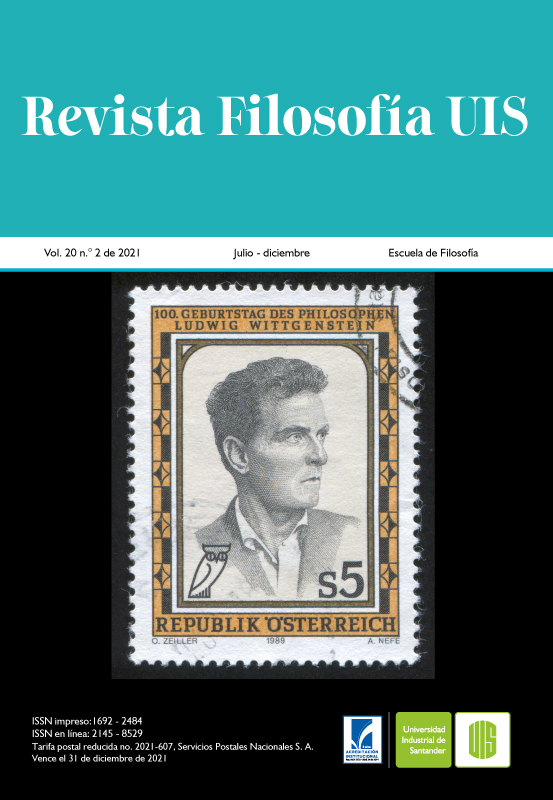The Problem of Political Obligation and the Natural Duty to Support Just Institutions in John Rawls's Theory
Published 2021-06-11
Keywords
- natural duty,
- political obligation,
- Rawls,
- law,
- justice
How to Cite
Copyright (c) 2021 Revista Filosofía UIS

This work is licensed under a Creative Commons Attribution 4.0 International License.
Abstract
The question “Why people should obey the law?” introduces one of the most complicated and discussed issues of the contemporary political and legal philosophy. Among the various responses given in the scientific literature, Rawls formulated the theory of the natural duty to support and promote just institutions. This paper aims to give a critical analysis of that proposal and to show how some of its weaknesses could be overcome through an approach that emphasizes the importance of preserving a beneficial social scheme that gives people a framework of possibilities for their moral development.
Downloads
References
- Baena, C. (2017). Obediencia al derecho y legitimidad estatal: un análisis de la teoría del deber natural de obedecer instituciones justas según Jeremy Waldron. Revista Eletrônica do Curso de Direito da UFSM 12(2), 675-691. https://doi.org/10.5902/1981369428341
- Brandt, R. B. (1964). The Concepts of Obligation and Duty. Mind, 73(291), 374-393.
- Cotroneo, C. (2017). ¿Obligación moral de obedecer el Derecho? La desobediencia civil en Rawls y su inclusión en el positivismo jurídico incluyente. Derecho y Humanidades, 25, 63-85. https://revistas.uchile.cl/index.php/RDH/article/view/47308
- Dworkin, R. (2005). El imperio de la justicia: de la teoría general del derecho, de las decisiones e interpretaciones de los jueces y de la integridad política y legal como clave de la teoría y práctica. Gedisa.
- Edmundson, W. A. (Ed.). (1999). The Duty to Obey the Law: Selected Philosophical Readings. Rowman & Littlefield.
- Egoumenides, M. (2014). Philosophical Anarchism and Political Obligation. Bloomsbury.
- Gómez Abeja, L. (2017). Una consideración actual sobre el deber de obediencia al derecho. La justificación de su incumplimiento por razones éticas. Revista de estudios políticos, 177, 89-111. https://doi.org/10.18042/cepc/rep.177.03
- Greenawalt, K. (1989). Conflicts of Law and Morality. Oxford University Press.
- Hart, H. L. A. (1955). Are There Any Natural Rights? The Philosophical Review, 64(2), 175-191.
- Hart, H. L. A. (1977). Obligación jurídica y obligación moral (J. Esquivel y A. Ortíz, trads.). Cuadernos de Crítica 3, 1a. ed. IIFs-UNAM.
- Horton, J. P. (2010). Political Obligation. Pelgrave Macmillan.
- Klosko, G. (1990). The Moral Force of Political Obligations. American Political Science Review, 84(4), 1235-1250.
- Klosko, G. (1999). Presumptive Benefit, Fairness, and Political Obligation. En W. A. Edmundson (Ed.), The Duty to Obey the Law: Selected Philosophical Readings (pp. 193-212). Rowman & Littlefield.
- Klosko, G. (2005). Political Obligations. Oxford University Press.
- Klosko, G. (2019). Why Should We Obey the Law? Cambridge Polity Press.
- Knowles, D. (2010). Political Obligation. A critical Introduction. Routledge.
- Nagel, T. (1991). Equality and Partiality. Oxford University Press.
- Polin, R. (1971). L’obligation politique. Presses Universitaires de France.
- Raphael, D. D. (1970). Problems of Political Philosophy. Praeger Publishers.
- Rawls, J. (1999a). Justice as Fairness. En S. Freeman (Ed.), Collected Papers (pp. 47-72). Harvard University Press.
- Rawls, J. (1999b). The Sense of Justice. En S. Freeman (Ed.), Collected Papers (pp. 96-116). Harvard University Press.
- Rawls, J. (1999c). Legal Obligation and the Duty of Fair Play. En S. Freeman (Ed.), Collected Papers (pp. 117-129). Harvard University Press.
- Rawls, J. (1999d). Unidad social y bienes primarios. En M. A. Rodilla (Ed. Y trad.), Justicia como equidad: materiales para una teoría de la justicia (pp. 263-289). Tecnos.
- Rawls, J. (2006). Teoría de la Justicia (M. D. González, trad.). Fondo de Cultura Económica.
- Raz, J. (1982). La Autoridad del Derecho. Ensayos sobre Moral y Derecho. Universidad Nacional Autónoma de México.
- Ross, A. (2008). El concepto de validez y el conflicto entre el positivismo jurídico y el derecho natural. Academia. Revista sobre enseñanza del Derecho, 6(12), 199-220. http://www.derecho.uba.ar/publicaciones/rev_academia/revistas/12/el-concepto-de-la-validez-y-el-conflicto-entre-el-positivismo-juridico-y-el-derecho-natural.pdf
- Simmons, A. J. (1979). Moral Principles and Political Obligation. Princeton University Press.
- Simmons, A. J. (2001). Justification and Legitimacy: Essays on Rights and Obligations. Cambridge University Press.
- Simmons, A. J. (2005). The Duty to Obey and Our Natural Moral Duties. En C. Wellman & A. J. Simmons (Eds.), Is There a Duty to Obey the Law? (pp. 91-196). Cambridge University Press.
- Singer, P. (1985). Democracia y desobediencia. Ariel.
- Tomás de Aquino (1993). Suma de Teología. Biblioteca de Autores Cristianos.
- Valentini, L. (2017). The Natural Duty of Justice in Non-Ideal Circumstances: On the Moral Demands of Institution-building and Reform. European Journal of Political Theory, 20(1), 45-66. https://doi.org/10.1177/1474885117742094
- Waldron, J. (1999). Special Ties and Natural Duties. En W. A. Edmundson (Ed.), The Duty to Obey the Law: Selected Philosophical Readings (pp. 271-299). Rowman & Littlefield.
- Wellman, C. & Simmons, A. J. (Eds.). (2005). Is There a Duty to Obey the Law? Cambridge University Press.
